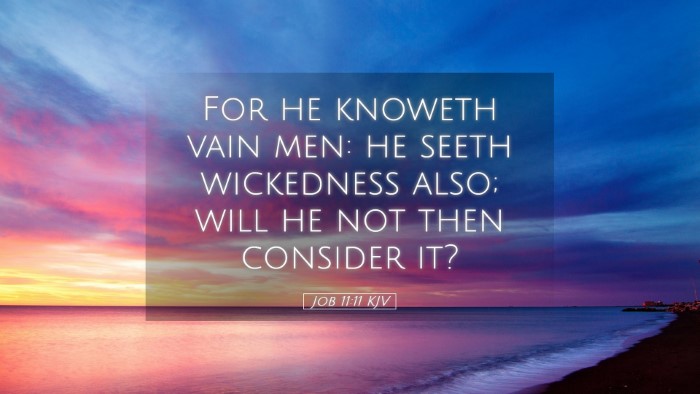Old Testament
Genesis Exodus Leviticus Numbers Deuteronomy Joshua Judges Ruth 1 Samuel 2 Samuel 1 Kings 2 Kings 1 Chronicles 2 Chronicles Ezra Nehemiah Esther Job Psalms Proverbs Ecclesiastes Song of Solomon Isaiah Jeremiah Lamentations Ezekiel Daniel Hosea Joel Amos Obadiah Jonah Micah Nahum Habakkuk Zephaniah Haggai Zechariah MalachiJob 11:11
Job 11:11 KJV
For he knoweth vain men: he seeth wickedness also; will he not then consider it?
Job 11:11 Bible Commentary
Commentary on Job 11:11
Verse: "For he knoweth vain men: he seeth wickedness also; will he not then consider it?" (Job 11:11)
Introduction
The book of Job, a profound exploration of suffering and divine sovereignty, raises critical questions about human existence, faith, and justice. Job 11:11 is spoken by Zophar the Naamathite, one of Job's friends, who attempts to offer a perspective on Job's suffering. This verse serves as a pivotal moment in the dialogue, revealing significant theological insights regarding God's omniscience and the nature of humanity.
The Context of Job 11
The context of this chapter is essential for understanding Zophar's words. Job has been lamenting his condition, expressing confusion and anguish over his undeserved suffering. Zophar responds with a mixture of rebuke and supplication, aiming to correct what he perceives as Job's misguided understanding of his situation.
Insights from Commentaries
-
Matthew Henry:
Henry emphasizes Zophar's inadequate grasp of Job's suffering. He comments that Zophar fails to recognize the complexity of Job's situation, conflating Job's pain with judgment for sin. Henry posits that while Zophar asserts God's knowledge of wickedness, he overlooks the grace and mercy that God extends to the righteous. Zophar's zeal to defend God leads to a mischaracterization of Job’s integrity.
-
Albert Barnes:
Barnes highlights that Zophar's statement acts as a reminder of God's awareness of human folly. The phrase "he knoweth vain men" suggests that God understands the emptiness of human pride and presumption. Zophar implies that Job may be guilty of such vain thinking. Barnes suggests that Zophar's conception of God is that of strict justice, overlooking the transformative power of God's love and empathy toward the contrite.
-
Adam Clarke:
Clarke interprets the verse in light of divine omniscience. He elaborates that God’s knowledge surpasses human understanding, including the innermost thoughts and intentions of mankind. Clarke rightly points out that the implication here is that Job’s claims of innocence are scrutinized under God’s all-seeing eye, provoking a theological discussion on the nature of suffering and righteousness. He notes that, in defending divine justice, Zophar inadvertently presents the tension between God’s fairness and human perception of equity.
Theological Implications
This particular verse raises essential theological implications related to the nature of God’s justice and the reality of human suffering. It prompts believers to reflect on the following aspects:
-
God's Omniscience:
The acknowledgment that God comprehensively knows the hearts of men invites humility among believers. It emphasizes the importance of approaching God with transparency, recognizing that nothing is hidden from His sight (Hebrews 4:13).
-
The Nature of Justice:
Zophar's assertion raises questions about the correspondence principle between suffering and sin. The retributive theology espoused by Zophar reflects a common ancient Near Eastern understanding that miscalculates the complexities of divine justice. Job's suffering challenges simplistic interpretations of justice.
-
Human Condition:
The description of "vain men" echoes themes found throughout the Scriptures about the fallen nature of humanity. It serves as a caution against self-righteousness and blind judgment. Believers are reminded of the need for repentance and grace amidst human weakness.
Practical Applications
The insights gleaned from Job 11:11 hold practical significance for contemporary readers:
-
Encouragement in Suffering:
For those enduring trials, the verse serves as a reminder of God’s awareness. It encourages believers to trust in God's sovereign plan, even when circumstances suggest otherwise.
-
Discernment in Judgment:
The warning against judgmental attitudes encourages humility. It challenges believers to refrain from hastily attributing suffering to personal sin, advocating instead for empathy and understanding.
-
Emphasis on Divine Mercy:
Understanding God's balance of justice and mercy can lead to a more profound engagement with the concepts of grace. Pastors and theologians can leverage this understanding to shape community discourse around suffering, justice, and the character of God.
Conclusion
Job 11:11 stands as a poignant reminder of the complexity of human experience in light of divine knowledge. Zophar’s declaration provokes essential reflections on God's omniscience, the nature of justice, and the human condition. By weaving together the insights from Matthew Henry, Albert Barnes, and Adam Clarke, we unveil a tapestry rich in theological depth that aids pastors, students, and scholars in grappling with the difficult questions of suffering and the character of God. Ultimately, the study of this verse invites believers into a deeper relationship with God, one that recognizes both His sovereignty and His mercy.


